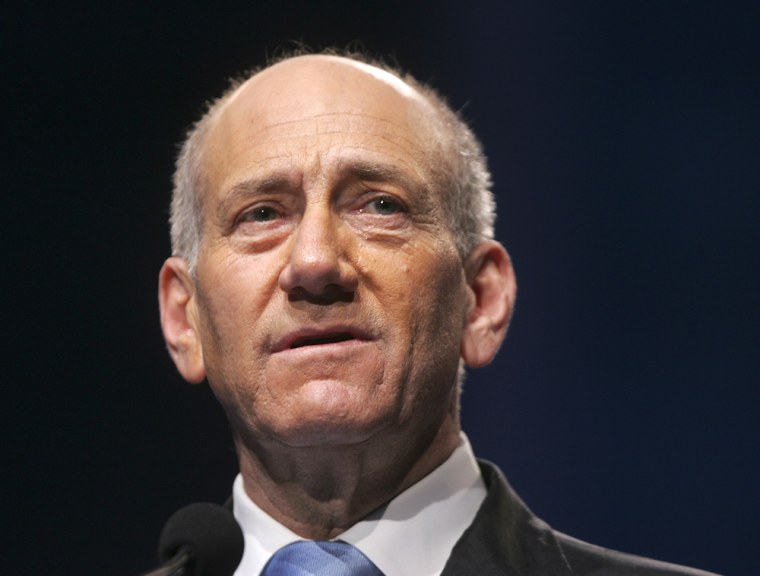Israel’s fears that Iran could obtain nuclear weapons and the Israeli government’s attempts to negotiate peace with the Palestinians and Syria are top agenda items when Israel’s beleaguered prime minister, Ehud Olmert, meets President Bush.
The most pressing issue for Wednesday’s talks, however, might not even be openly discussed: Olmert’s deteriorating political situation back home, where his popularity has nose-dived because of a new corruption scandal and where the end of his term is largely seen as just a matter of time.
Those developments are jeopardizing Bush’s already ambitious timetable for an Israeli-Palestinian peace agreement by year’s end and are making it unlikely that Bush or Olmert will be able to shepherd the process to completion.
For Olmert, a friendly meeting with a stalwart ally like Bush is a marked change from what he left behind in Israel, where his political allies are conspicuously refusing to come to his defense and jostling for his job.
Iran a prime concern
Topping the list of discussion points at the Bush-Olmert meeting is Iran, a prime concern for both countries, though each has a different intelligence assessment on the state of Iran’s nuclear program. Israel believes that Iran has not suspended its nuclear weapons program, despite a report to the contrary by U.S. intelligence.
“I think they both made their points very clear, and Israel has made it clear that they think ... that intelligence is wrong, and that Iran is still pursuing a nuclear weapon,” White House press secretary Dana Perino said ahead of the meeting.
Israeli newspapers also have reported that Olmert hopes to acquire a sophisticated U.S. missile defense system, advanced radar and new warplanes.
In an indication of what Olmert is likely to tell Bush, the Israeli prime minister told thousands of Israel supporters at the annual convention of the pro-Israel American Israel Public Affairs Committee on Tuesday that the Iranian threat “must be stopped by all possible means.”
Olmert said international sanctions aimed at stopping Iran from developing nuclear weapons must be ratcheted up urgently, and he suggested measures like banning Iranian businessmen and financial transactions and imposing sanctions on Iran’s crucial import of gasoline.
Olmert said the world should see that “the long-term cost of a nuclear Iran greatly outweighs the short-term benefits of doing business with Iran.”
But sanctions are “only an initial step,” and Iran’s flouting of the international measures so far “leave no doubt as to the urgent need for more drastic and robust measures,” Olmert said.
Negotiations with Palestinians
He is also expected discuss with Bush Israel’s peace negotiations with the Palestinians and with Syria, according to Olmert spokesman Mark Regev.
Israel renewed peace talks with Syria last month without the involvement of the U.S., which has tried to isolate the Syrian regime. Syria’s president said in interviews published Tuesday in the United Arab Emirates that the U.S. would have to become involved if the process is to succeed.
But while it is not a party to the Syria talks, the Bush administration has become deeply involved in Israel-Palestinian peace negotiations. Bush set the target for a peace agreement at the end of the year, saying Olmert and Palestinian President Mahmoud Abbas are the right people to lead a historic compromise.
But the Bush administration now seems aware that Olmert could be on his way out. The Israeli-Palestinian peace process “is bigger than any one person, and that we’re going to continue to work on it, despite what may or may not be happening in Israeli political circles,” Perino said.
Speaking to the AIPAC lobby’s annual conference, Olmert made only one oblique reference to his domestic woes, mentioning that he briefly considered calling off his visit to the U.S. because of “the recent political developments in Israel of which you are aware.”
Olmert was addressing the group of powerful American Israel supporters just as his relationship with one such supporter threatens to ignominiously end his term in office. The testimony of New York businessman Morris Talansky, who claims to have given Olmert envelopes stuffed with cash over a decade and a half, in part to fund a lavish lifestyle, has thrown Israel’s political system into turmoil.
Olmert’s key coalition partner, Defense Minister Ehud Barak, now says he’ll topple the government if Olmert doesn’t step aside. And Olmert’s rivals in his Kadima Party, including his popular deputy, Foreign Minister Tzipi Livni, are jostling for position and gearing up for party primaries.
